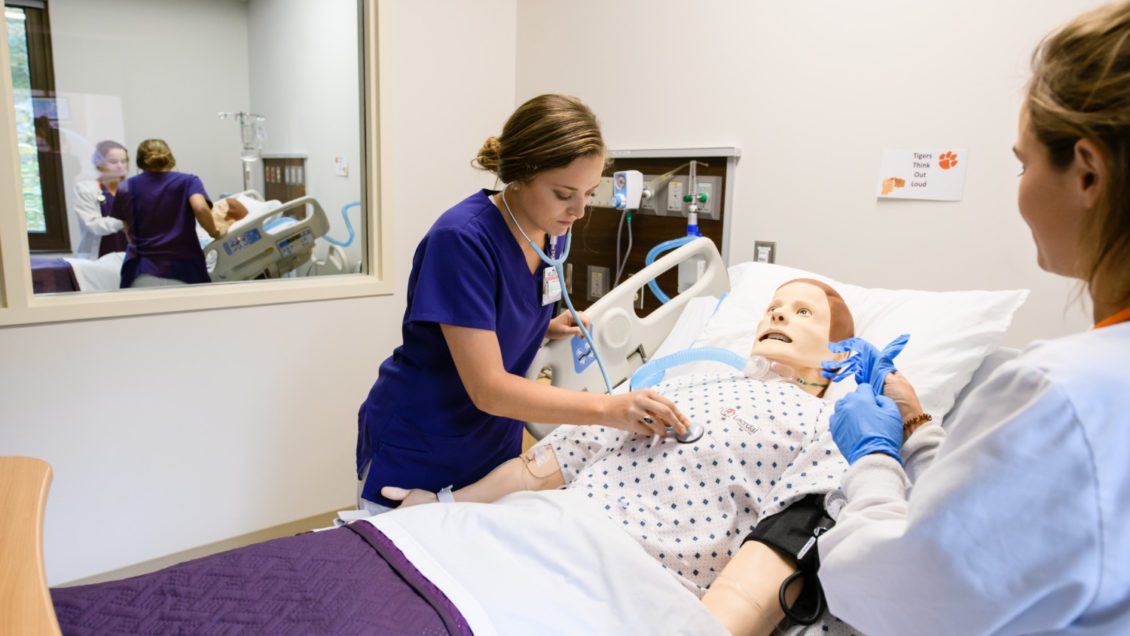
The Commission of Collegiate Nursing Education (CCNE) has awarded the Clemson University School of Nursing‘s Bachelor of Science in Nursing, Master of Science in Nursing, and Doctor of Nursing Practice programs a full 10-year accreditation, the longest term offered by the accrediting body.
The CCNE is a part of the American Association for Colleges of Nursing (AACN), and its accreditation is a nongovernmental, peer review process that operates within nationally recognized standards. The Clemson University School of Nursing is one of 15 CCNE-accredited institutions in South Carolina, and one of five that have these three accredited degree programs: Bachelor of Science in Nursing, Master of Science in Nursing, and Doctor of Nursing, according to CCNE.
Kathleen Valentine, the School of Nursing director and Clemson University chief academic nursing officer, said that accreditation is a process that improves the quality of education in a nursing program, ensuring that professional standards and student needs are met.
“Our faculty and staff have done a tremendous job ensuring that our programs are accredited and that they remain so,” Valentine said. “Having all of our nursing degree programs not only accredited, but given full accreditation for 10 years, assures the students that they are getting the best nursing education they can receive.”
During the accreditation process, programs are evaluated for success in achieving its mission, goals, and expected outcomes and assessed for the extent to which the program meets accreditation standards. This process is meant to foster continuous improvement in nursing programs and the professional practice, creating a high level of expectation for nursing education, said Deborah Willoughby, a School of Nursing faculty emerita who coordinated the school’s accreditation preparation.
“Accreditation is the hallmark of a quality education, indicating that the program meets the high standards established by the accrediting agency,” Willoughby said. “Being awarded the maximum 10 years of accreditation reflects CCNE’s acknowledgment of the high quality of Clemson Nursing and the programs we offer.”
Accreditation of nursing programs also helps improve a graduate’s employment opportunities. According to the AACN, nurses who graduate from non-accredited schools may face obstacles obtaining a license, and employment options can be limited. This accreditation also allows Clemson nursing graduates to receive a first-rate education that helps them meet the needs of the people they treat, said Stephanie Davis, Clemson School of Nursing’s graduate director.
“CCNE accreditation ensures continuous program evaluation and improvement to offer high-quality programs of nursing,” Davis said. “Our programs educate and prepare nurses, nurse practitioners, nurse administrators, and nurse educators to meet the needs of the global community and the people they serve.”

The accreditation process includes a site visit by a CCNE evaluation team. In February, the School of Nursing hosted its site visit, which included tours of Edwards Hall on Clemson’s main campus, the Clemson University Nursing building in Greenville and multiple clinical placement locations. The CCNE evaluation team also interviewed students, faculty, staff and community stakeholders during the site visit and combed through years’ worth of documents highlighting the school’s programs, students, faculty, staff and alumni accomplishments.
Before the site visit, the School of Nursing conducted an intensive 12-month self-study of all its nursing programs, which resulted in an extensive document detailing the School of Nursing’s academic and scholarly work over the past several years with highlighted successes and challenges.
Willoughby said the self-study document was a team effort as ideas, information, and examples of student work were solicited from all faculty.
“The self-study is a critical part of continuous quality improvement for nursing programs,” Willoughby said. “I think that the self-study process and the resultant accreditation enhanced the faculty’s sense of pride regarding their work.”
The review process also allowed faculty to evaluate ways to improve and grow the School of Nursing’s renewed emphasis on research, said Lucia Gonzales, School of Nursing associate research director.
“One of the key review items in the CCNE review process was research engagement, including the resources provided to conduct research,” Gonzales said. “CCNE reinforces the importance of research. Through research, data and scholarly articles are published that have an impact on the nursing profession. We add to the body of knowledge of nursing by conducting this research.”
The CCNE self-study document addresses four standards of program quality and effectiveness: mission and governance, institutional commitment and resources, curriculum and teaching-learning practices, and assessment and achievement of program outcomes. The CCNE Board of Commissioners reviews the self-study document, the site evaluation report, and the program’s response to the report prior to determining accreditation status.
“CCNE accreditation is highly respected and nationally recognized and ensures the quality and integrity of nursing education programs,” said Ann Wetsel, associate director of the School of Nursing. “CCNE accreditation represents the extraordinary contributions of Clemson University School of Nursing faculty, staff, students, alumni and community advisory board members to the baccalaureate, master’s and Doctor of Nursing Practice programs.”
These three programs will be up for reaccreditation in December 2030, with an on-site evaluation in the Spring of 2030.
The Clemson University School of Nursing is part of the University’s College of Behavioral, Social and Health Sciences (CBSHS). Established in July 2016, CBSHS is a 21st-century, land-grant focused college that combines work in seven disciplines – communication; nursing; parks, recreation and tourism management; political science; psychology; public health sciences; sociology, anthropology and criminal justice – to further its mission of “building people and communities” in South Carolina and beyond.
Get in touch and we will connect you with the author or another expert.
Or email us at news@clemson.edu

